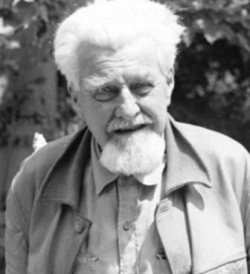Sir Konrad Lorenz

- Born
- 7 November 1903
- Died
- 27 February 1989 (age 85)
Sir Konrad Lorenz was a German-born British biochemist who is considered to be the founder of modern ethology, the study of animal behaviour. He helped to contribute to the understanding of how behavioural patterns may be traced to an evolutionary past, and is known for his work on aggression. Lorenz was awarded a Nobel Prize for Physiology or Medicine with fellow animal behaviourists Karl von Frisch and Nikolaas Tinbergen in 1973.
Lorenz was interested in animals at a very early stage, and had many different animals; fish, birds, monkeys, dogs, cats and rabbits. He even set up a small centre for nursing sick animals from the nearby zoo, and was an avid ornithologist, keeping detailed records of bird behaviour in the form of diaries.
Lorenz studied medicine and spent two terms at Columbia University in New York before returning to Vienna in Austria. Throughout his medical studies, Lorenz was interested in animal behaviour, and created a diary about a jackdaw that was eventually published in 1927. He studied for a master’s degree at the University of Vienna in 1928 and completed his PhD in zoology in 1933.
Philosophers are people who know less and less about more and more, until they know nothing about everything. Scientists are people who know more and more about less and less, until they know everything about nothing.
Lorenz loved studying animal behaviour, and was well known for keeping flocks of birds such as jackdaws and greylag geese, and he published a series of research paper on his observations of them. He went on to describe the phenomenon of imprinting, and was involved in founding the German Society for Animal Psychology.
Lorenz served as a physician in the German army from 1942 to 1944, and was captured as a prisoner of war in the Soviet Union. In 1948 he returned to Austria where he headed the Institute of Comparative Ethology at Altenberg from 1949 to 1951. He founded the comparative ethology department in the Max Planck Institute of Buldern in Westphalia.
In 1973, along with Frisch and Tinbergen, he was awarded the Nobel Prize for Physiology or Medicine for their discoveries concerning animal behaviour.
Lorenz advanced our scientific understanding of how behavioural patterns evolve in a species. His research helped to identify how behavioural patterns develop during an organism’s life, and he proposed how an animal’s genetics allow it to learn information that is important for the survival of the species.



